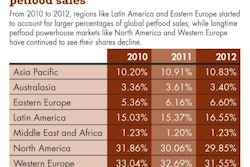Since the Food Safety Modernization Act (FSMA) was signed into law in January 2011, I have seen reactions in our industry ranging from approval to grudging acceptance to complaints to anxiety. I have even heard anecdotes about a few, mainly smaller petfood or treat manufacturers who say they do not have the time or resources to comply with the law and its regulations, so they plan to just ignore it.
Apparently, this attitude also exists in the human food industry, at an alarmingly high rate: According to a new survey reported by Sudhakar Kaup in FSM eDigest, 45% of respondents said they have not yet taken into consideration the planning or budgeting that must address the FSMA guidelines. "Moreover, a shocking 76% of all respondents stated that they do not plan on making changes to meet the guidelines," Kaup writes.
While the petfood industry has successfully followed human food in many ways, this is one trend that does not seem worth adopting. It reminds me of young kids playing hide-and-seek and hiding behind a curtain with their feet sticking out in plain sight; yet they believe that since they can't see the person who is "it," that person can't see them, either. While respondents to this survey legitimately claim that they are unsure how FSMA will affect their processes (47%) and their biggest concern with the law is "uncertain or unclear implications" (44%), that's not an excuse for assuming that if the picture isn't clear, they can choose to believe it just doesn't exist.
Unfortunately, Kaup does not provide any information about the survey itself: who conducted or funded it, the methodology, how many food and beverage manufacturers were polled and how many responded, even the name of the survey. So perhaps we should not award much weight to these findings. But, as Kaup points out, not only is the Food and Drug Administration (FDA) watching food (and petfood) manufacturing plants more closely now, "once rules and regulatory laws are well defined—as they are in FSMA—litigation against manufacturers becomes more common. When there are explicit laws that seem to be broken, lawyers can easily win a case through careful nitpicking and execution."
My only disagreement with Kaup is that FSMA's rules and regulatory laws are well defined—but they are starting to get there. After releasing two of seven key regulations earlier this year (preventive controls for human food and produce safety standards), at the end of July FDA released two more: a proposed rule for the Foreign Supplier Verification Program and one for accreditation of third-party auditors. According to John Shapiro, partner at Freeborn & Peters LLP and also reporting in FSM eDigest, the agency is very close to releasing the regulation of most relevance and importance to petfood manufacturers: preventive controls for animal feed. (I've heard corroboration of that from petfood industry insiders.)
FSMA is definitely complex and represents a huge shift in how FDA regulates food safety and how manufacturers—both for human food and petfood—must now ensure and document the safety of their products and process. It represents potentially significant investments in people, technology, system changes and other resources. Thus, it's critical that manufacturers become fully aware, informed and engaged in how these regulations will affect their businesses. "Food companies continue to have an important opportunity to shape the very rules that will govern their operations and impact their success. That is, food companies, and other constituencies with interest in the operation of the rules, have 120 days from the date of publication" to comment on the proposed rules, Shapiro says.
With the two newest rules being released July 29, industry experts and representatives can comment through November 26. In fact, Shapiro writes: "Recognizing the import of such industry analysis, FDA indicates that it intends to extend by another 60 days, from September 16 until November 15, 2013, the date by which comments may be submitted on the proposed preventive control and produce safety rules." The agency has even provided information and tips on how to comment on FSMA.
Likewise, once the proposed rules for preventive controls for animal feed are released, you will have 120 days to comment and try to help shape the regulations. That is a much more proactive and wise approach than pretending they don't exist.
















